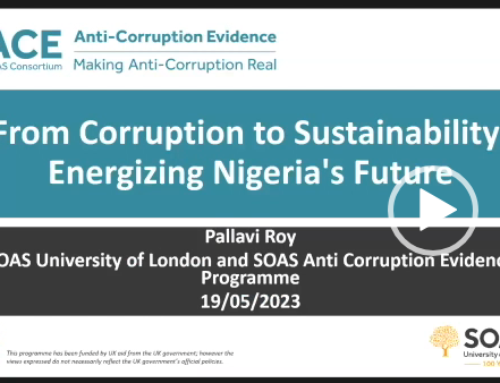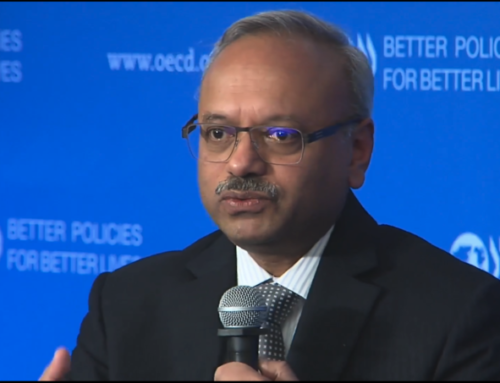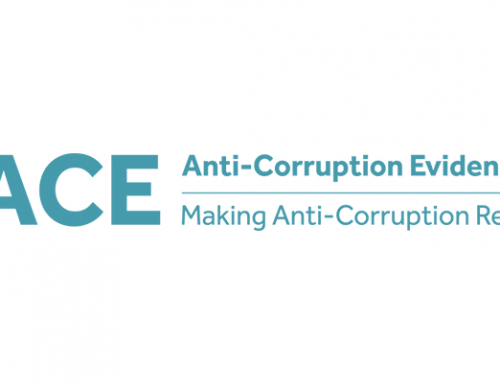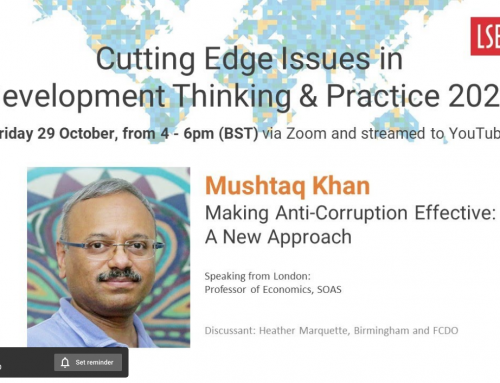This blog was written Dr Pallavi Roy (Research Director) and Dr Mitchell Watkins (Research Fellow) of the SOAS Anti-Corruption Evidence Consortium.
The blog was originally published on The Global Anticorruption Blog (GAB) on 16 December 2020. It is republished here under a Creative Commons licence.
Nigeria’s Economic and Financial Crimes Commission (EFCC), established in 2003, was initially effective at investigating and prosecuting bribery, fraud, tax evasion, money laundering, and a host of other financial crimes. Indeed, it was instrumental in prosecuting senior political leaders and corporate actors involved in illegal activities, as well as in recovering significant stolen assets that belonged to the Nigerian state. More recently, however, the Commission has been subject to frequent political interference and corruption. For example, a recent SOAS-ACE study found that private actors—commercial banks, businesses, and high net-worth individuals—routinely exploit the coercive power of the EFCC to help them recover their debts, rather than turning to the courts and other civil dispute resolution mechanisms. This occurs even though, as a matter of law, civil debt collection lies outside the EFCC’s jurisdiction.
How and why does this occur? For starters, even though the EFCC is not supposed to deal with civil debt collection, the agency has very broad powers to investigate and prosecute economic and financial crimes. Businesses and other creditors seeking to recover debts can allege criminal fraud on the part of the borrower in order to get the EFCC involved. In addition, powerful private-sector actors (notably powerful banks) can use their use their informal political connections with the agency to influence EFCC investigations, so that pressure is applied to particular debtors. And creditors have strong incentive to get the EFCC involved, given the costs and delays associated with Nigeria’s civil-legal architecture for debt recovery. By comparison, the EFCC seems a more expedient and effective route to recover debts than civil proceedings. So, despite occasional reprimands from Nigerian courts, the EFCC has continued to operate as a de facto debt collection agency, investigating civil disputes associated with criminal fraud proceedings initiated by private creditors hoping to settle commercial debts.
This development is a serious concern for anticorruption activists, for two reasons. First, the use of informal influence and political connections to induce the EFCC to bring certain cases favored by private businesses is itself (arguably) a form of corruption. Second, the devotion of scarce EFCC time and resources to these debt collection cases undermines the EFCC’s capacity to operate as an effective anticorruption agency. We suggest two types of reform that would help address this problem:
- First, because EFCC involvement in debt collection cases is primarily attributable to flaws in civil dispute resolution mechanisms, judicial reforms are needed to help restore public confidence. Such reforms should include fast-track procedures for large debt claims, expansion of small claims courts, and pre-action dispute settlement protocols to encourage alternative dispute resolution (negotiation, mediation, and arbitration). The Lagos State High Court has already taken some measures to address these issues, but recommend broader adoption of such reforms by the other 35 states of the Nigerian federation.
- Second, the EFCC should publicize its procedures for determining which cases to investigate, and devise a triage process (overseen by the Attorney General) for prioritizing petitions, in order to limit the extent to which powerful private-sector players can influence proceedings. These measures would force creditors and their lawyers to think more carefully before cavalierly submitting petitions to the EFCC over matters that are civil in nature.






